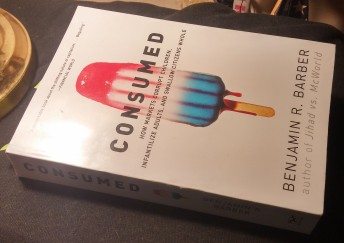Consumed – How Markets Corrupt Children, Infantilize Adults and Swallow Citizens Whole, Benjamin R. Barber, W.W. Norton, 2007, 406 pg
 Benjamin Barber’s sortie against consumerism is sure to reverberate from the glass tower offices of big box USA to the indolent consumer buying pre-peeled oranges (a real example of infantilization of society).
Benjamin Barber’s sortie against consumerism is sure to reverberate from the glass tower offices of big box USA to the indolent consumer buying pre-peeled oranges (a real example of infantilization of society).
As way of general review, Barber’s main avenue of assault is by drive by shooting. Barber has a lengthy list of target and what he does is drive up, unloads his quick assault and then drives off to the next target, in other words, Barber’s pages are packed dense with many ideas and examples, but often he only spends a few sentences discussing them. His writing sometimes feels like being in a swamp, a humid, slow trotting affair, that takes time to get through. Other times Barber writing is lucid and reads like a car drives over fresh highway. In other words: Barber writes like a political theorist, fitting because he is a political scientist by trade. Barber divided his book into three sections: The Birth of consumers, the eclipse of citizens and the fate of citizens.
Barber’s main theme is fighting against the hyper-consumption in our contemporary era . Consumerism, according to Barber is the latest stage of capitalism, one where needs are no longer met by producers but our needs are being produced by producers. Advertising and marketing serve to enhance our wants, thus, producers can produce more. The greatest threat to producers, is not over-producing, but people not buying enough. An ad in 1926 from Life magazine had the header “GO AHEAD AND MAKE US WANT” (pg.291), which shows us the early recognition of advertising in society. This is the spine of his argument, to which Barber navigates various aspects of the rise of consumerism, the pass-over of the Protestant ethos to an infantilized ethos, the ascent of markets and the supremacy of the private, then Barber closes with some words on what can be done about this consumer melancholy.